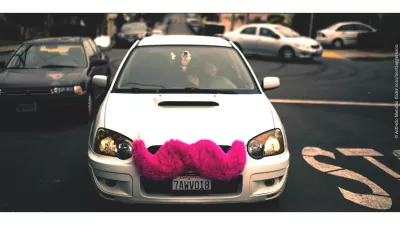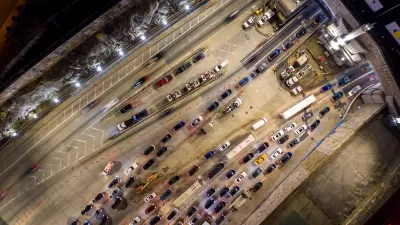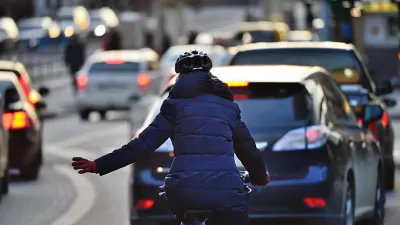A new Deloitte report evaluates ways that new technologies and mobility services help reduce the need to own and use private automobiles. Helsinki's audacious goal: By 2025, no city resident will need to own a private car.
The new report Smart Mobility: Reducing Congestion and Fostering Faster, Greener, and Cheaper Transportation Options, by Deloitte University, evaluates new business models inspired by the sharing economy and disruptive technologies that are ushering in the era of "smart mobility." These include on-demand ride services like Uber and Lyft, real-time ridesharing services such as Carma and Zimride, carsharing programs such as Zipcar and car2go, bike sharing programs, and thousands of miles of new urban bike lanes that are changing how people get around. It explores how urban planners can support these technologies and services in order to help reduce congestion, traffic accidents, pollution emissions and parking facility costs.
It describes Helsinki's audacious goal: By 2025, the city plans to make it unnecessary for any city resident to own a private car. The goal is an on-demand mobility system that would allow customers to choose among public and private transport providers and assemble the fastest or cheapest way of getting anywhere they need to go at any time.
The report offers detailed policy recommendations for each mode that can help policymakers and city planners begin to reap the benefits of these alternative modes, with potential savings tables and maps that explore the potential of these strategies to reduce automobile travel in specific neighborhoods.
FULL STORY: Smart Mobility: Reducing Congestion And Fostering Faster, Greener, And Cheaper Transportation Options

Alabama: Trump Terminates Settlements for Black Communities Harmed By Raw Sewage
Trump deemed the landmark civil rights agreement “illegal DEI and environmental justice policy.”

Study: Maui’s Plan to Convert Vacation Rentals to Long-Term Housing Could Cause Nearly $1 Billion Economic Loss
The plan would reduce visitor accommodation by 25% resulting in 1,900 jobs lost.

Why Should We Subsidize Public Transportation?
Many public transit agencies face financial stress due to rising costs, declining fare revenue, and declining subsidies. Transit advocates must provide a strong business case for increasing public transit funding.

Paris Bike Boom Leads to Steep Drop in Air Pollution
The French city’s air quality has improved dramatically in the past 20 years, coinciding with a growth in cycling.

Why Housing Costs More to Build in California Than in Texas
Hard costs like labor and materials combined with ‘soft’ costs such as permitting make building in the San Francisco Bay Area almost three times as costly as in Texas cities.

San Diego County Sees a Rise in Urban Coyotes
San Diego County experiences a rise in urban coyotes, as sightings become prevalent throughout its urban neighbourhoods and surrounding areas.
Urban Design for Planners 1: Software Tools
This six-course series explores essential urban design concepts using open source software and equips planners with the tools they need to participate fully in the urban design process.
Planning for Universal Design
Learn the tools for implementing Universal Design in planning regulations.
Smith Gee Studio
Alamo Area Metropolitan Planning Organization
City of Santa Clarita
Institute for Housing and Urban Development Studies (IHS)
City of Grandview
Harvard GSD Executive Education
Toledo-Lucas County Plan Commissions
Salt Lake City
NYU Wagner Graduate School of Public Service





























